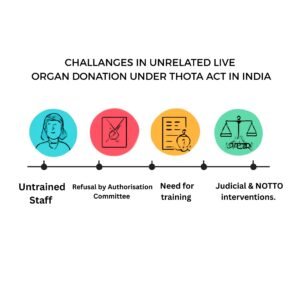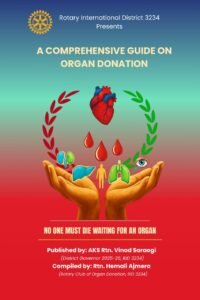
Unrelated Organ Donation under the THOTA Act: Challenges and the Road Ahead
The Transplantation of Human Organs and Tissues Act (THOTA), first enacted in 1994 and updated over the years, expressly allows for unrelated (non-near relative) living organ donation in India, provided the donation is made out of genuine love and affection, and not for commercial gain.
Section 9(3) of THOTA enables unrelated donors to donate organs, but only after they receive approval from the Authorization Committee—a safeguard put in place to ensure there is no illicit organ trade and that the donor’s consent is voluntary and informed.
Legal Provisions: What THOTA and the Rules State:
- Unrelated donation is permitted as long as the donor demonstrates true affection for the recipient, and there is no evidence of any commercial transaction.
- The donor and recipient must present documentary evidence of their relationship, such as photographs, statements, and proof of association, to the Authorisation Committee.
- The committee is mandated to conduct interviews, review documents, and ascertain the absence of any coercion or financial inducement.
Ground Reality: Barriers in Implementation
Despite these clear legal provisions, in everyday practice at most hospitals and by many Authorization Committees across India, requests for unrelated donations are frequently rejected outright. Common responses to patients and their families include statements like, “This is not possible,” or “We do not do such cases.” Even in metropolitan hospitals, the default approach is often to refuse the application, forcing families to appeal in court.
Why does this gap exist?
- Many Authorization Committee members and hospital staff lack proper training on evaluating unrelated donor cases, what evidence to ask for, and how to make an informed, unbiased decision.
- Instead of a structured assessment, refusal or our right denial is often the easiest path, leading distressed families to judicial intervention—delaying life-saving treatment.
Judicial and Regulatory Responses
The Delhi High Court judgment dated 4 January 2024 (delivered by Justice Prathiba M Singh) addressed long-standing delays in processing organ donation and transplant applications, particularly those involving living unrelated donors.
The court established a strict timeline and urged the Ministry of Health and Family Welfare and NOTTO (National Organ and Tissue Transplant Organization) to prescribe and enforce time-bound steps at every stage of the transplant approval process.

Key Court-Directed Timeline for Organ Donation Applications
- Application Processing: Must be completed within a maximum of 10 days from submission.
- Residency Document Verification: To be finished within 14 days.
- Rectification of Documentation: Donor/recipient should be informed of deficiencies and be allowed a maximum of 1 week to rectify them.
- Interview Scheduling: After 4-6 weeks of application receipt, interviews of the donor and recipient (and their families) should be conducted within the next 2 weeks.
- Decision Communication: Decision to be conveyed promptly after interviews.
- Ideal Total Duration: The entire process from initial application to final decision should not exceed 6-8 weeks.
- The High Court also underscored that:
- Timely and well-documented decisions, not mere rejections, are vital, and any refusal by committees must be based on a thorough review and properly justified6.
- The aim of THOTA is to regulate—not to obstruct—altruistic organ donation.
Guidance from NOTTO
The National Organ & Tissue Transplant Organisation (NOTTO), responsible for coordinating activities related to organ donation and transplantation in India, has periodically issued notifications and manuals. These aim to:
- Standardize documents, interview protocols, and evidence requirements for unrelated donations.
- Remind states and hospitals to follow THOTA’s intended spirit—neither enabling commerce nor discouraging legitimate, loving donations.
The Way Forward
To align everyday practice with both the law and humanitarian need:
- Authorization Committee members and hospital staff require structured training on THOTA provisions, including practical aspects of document verification, interviews, and impartial evaluations.
- Committees must adhere to the judicially specified timelines and maintain transparency in their decisions.
- Implementing standardized protocols and checklists, as recommended by NOTTO, can help prevent both exploitation and arbitrary refusals.
Conclusion
Unrelated organ donation, when motivated by love and affection, is fully legal under Indian law. The barriers faced by patients today are less about the law and more about gaps in implementation, training, and administrative inertia. With proper education, training clear timelines, and oversight—as reinforced by courts and NOTTO—India can strike the right balance between protecting vulnerable individuals and enabling lifesaving generosity.
Updates: 2 Sep. 2025 – Madras High Court
On September 2, 2025, the Madras High Court set aside the denial of a kidney transplant between two family friends, after the Authorisation Committee had rejected the case over alleged lack of documentary proof of their friendship. Justice N. Anand Venkatesh clarified that emotional bonds “cannot be confined to the pages of a file” and committees must not act as mere rubber stamps. Altruism can be shown through statements, interviews, and personal testimony—strict paperwork is not always possible or human. The court directed that, in absence of financial evidence, “permission should be granted” for genuinely motivated donations, quashing the requirement for unrealistic proof of friendship.
About the Author:
This blog is authored by Advocate Prashant Ajmera, Co-founder of OneineiOnelaw.org, along with his wife Hemali Ajmera, who is a kidney recipient. Advocate Ajmera offers pro bono services to families, transplant coordinators, hospital management, and Authorization Committees, assisting in the evaluation and determination of live organ donation cases—both related and unrelated.
OUR MISSION
Our mission is to promote a clear, consistent, and unambiguous implementation of The Transplantation of Human Organs and Tissues Act, 1994 and the Transplantation of Human Organs and Tissues Rules, 2014 in every hospital across India. We aim to ensure that every patient is able to access organ transplantation without facing any legal complexities or inconsistencies.
CONTACT US
- Office +91-9157184643
- info@oneindiaonelaw.org
- One India One Law - Copyright 2023
- PSR (Professional Social Responsibility) an initiative of Ajmera Law Group | Donation not accepted
- info@oneindiaonelaw.org



